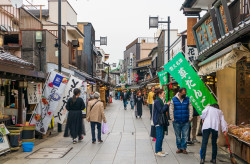
September 18, 2008
Drive Time
From unruly passengers to political scandals, Tokyo’s cabbies travel a rough road to success
By Metropolis
Originally published on metropolis.co.jp on September 2008

Tokyo is a city governed by speed. Bullet trains slice through its heart while subways dissect its underbelly. But these are faceless methods of transport. The true character of Tokyo’s roads can be found in its taxis, those ferries of the night that trawl through the neon-soaked streets. To some they are simply another method of getting from A to B. To the captains of those black, green, and beige sedans, however, driving is a livelihood—and one that is under threat.
Take higher fares and fuel costs, then throw in stiffer competition, a few scandals, increasingly bold passengers and mandated smoking bans, and it’s clear something’s gotta give. On one recent journey through Tokyo’s twisty streets, a driver in his 50s revealed, “I don’t enjoy a single aspect of my occupation.” Given the recent negative spotlight that’s been cast on his industry, it’s easy to sympathize with the statement.
Even among the notoriously hardworking Japanese, Tokyo cabbies keep up a relentless schedule. It isn’t rare for a driver to start at 9am and burn on through until 4 o’clock the next morning. Short breaks and plenty of coffee keep them from shutting down completely, which is why it’s no surprise that back alleys are often full of sleeping cabbies, those who have made the decision to give themselves and their workhorses a rest.
With all this hard work you would expect drivers to take home a decent wad of cash. Yet the Tokyo Taxi Association says the average wage is around ¥4.5 million. The economic dip in the ’90s hit drivers hard, and as the city’s public transportation system has grown ever more efficient, fewer people are making use of its taxis. A 7 percent fare hike in December of last year, the first in over a decade, has done even more damage. Rather than helping drivers make ends meet, it has dissuaded Tokyoites from splurging on chauffeured transportation. The Japan Economy News website reported a 2.8 percent decrease in drivers’ daily earnings over the first month the fares were raised, and the Daily Yomiuri notes that the trend has continued with six consecutive months of declining revenues.

As if long hours and declining business weren’t enough, recent revelations that Tokyo cabbies offered kickbacks to federal employees for their patronage has damaged the reputation of the entire industry. In June, nearly 450 officials were rebuked for accepting gifts and other favors from drivers. In some cases, the pols were simply allowed to smoke during their ride, but in many others they were given coupons for beer and, in some cases, even cash. As long as officials continued using the same cab company, the presents would keep on coming. BBC News reported that as much as US$20,000 worth of goodies were accepted by one politician over a five-year period.
But even this scandal, which dominated national headlines for weeks, seems like kid’s stuff compared to revelations in a new book. Takushi Uramonogatari (“Taxis: The Real Story”), by 44-year-old Chiba cabbie Masayoshi Ise, gives an insider’s view of what goes on in the backseat—and the front seat—of Tokyo taxis. More and more customers, it seems, are using cabs for illicit activities, with Ise offering firsthand accounts of his vehicle as a getaway car or a metered love hotel.
Interviews with Tokyo cabbies back up these claims. “I get a lot of people having sex in my cab,” said one driver we spoke to who requested anonymity, but who added: “We aren’t scared, and if people are bad we kick them out.” A Tokyo garage owner in his 50s who gave his name as Kanemoto says many of his drivers complain of passengers offering bribes for his drivers’ cooperation in carrying out all manner of illegal activities. But it’s not just the passengers that are causing the difficulties—Kanemoto says he experiences so many problems with drivers operating under the influence of alcohol that he’s been forced to install DUI blocks in the ignition system of his cabs.
In the face of such difficulties, who, then, would become a Tokyo cabbie? Actually, pretty much anyone who wants to. Companies are always hiring, and the process is remarkably straightforward: applicants just need a clean driving record and a passing score on a 40-question exam that tests their knowledge of the city’s layout. Once a driver has cleared that hurdle, he or she joins one of the city’s myriad companies, picks up his keys, and starts the never-ending road trip that is his job. In light of the 2-4 years of unpaid work a London cab driver has to go through before he can get his license, it’s understandable why Tokyo cabbies rely so heavily on their GPS systems.
After drivers hit the road, companies grade their performance via a system that assigns a letter grade from C (the bottom) to AA (tops). For so-called “white” cabs, which are independent and privately owned, the ranking involves stars instead of letters. The significant difference between the two is that the stars are only issued once and never taken away—even after traffic violations, accidents or customer complaints.
The system is a boon for highly rated drivers but increases the pressure on everyone else. This intense competition has ramped up since the taxi industry was deregulated in 2002. Once the government removed barriers to entering the market, a deluge of new companies flooded including those, like Hello Tokyo Taxi and Tokyo MK, boasting lineups of specialty and luxury vehicles.

But while the government has relaxed some controls, Tokyo’s two main taxi associations have implemented others. In January, 95 percent of the city’s nearly 60,000 cabs became cigarette-free. Predictably, the ban caused a storm of protest in nicotine-addled Japan. The matter came to a head in April, when dispatchers publicly refused to route calls to 83 drivers who were found to be ignoring the order. Since then, by all accounts, riders can enjoy a surreptitious cigarette in the back by offering tips to their driver, and even cabbies themselves are often known to violate the order. “Its bad for our health, but I still like smoking,” said one driver who requested anonymity while slyly lighting up in his cab.
Thanks to the industry’s recent difficulties, the Construction and Transport Ministry recently announced it may revisit the deregulation issue next year. The move would put a stop to the influx of new taxi companies and, it is hoped, raise wages for everyone else. In the future, we may see fewer taxi drivers queuing up at stations, but those waiting to pick you up may be a whole lot happier.







